The Master Plan for the Development of the Guangdong-Macao Intensive Cooperation Zone in Hengqin (the Plan) mentions that the University of Macau (UM) and other higher education institutions will build institutes in Hengqin for industry-academia collaboration to a high standard and establish a technology innovation and transfer centre. In recent years, UM has been building its first institute for industry-academia collaboration in Hengqin New Area through its Zhuhai UM Science and Technology Research Institute (ZUMRI), and has already introduced a number of technological projects into the institute for technology transfer. As UM Rector Yonghua Song stresses, it is imperative to accelerate the creation of a technological innovation system within HE institutions in order to move research results from laboratories to production lines in a more efficient manner, and creating such a system is especially important for enhancing HE institutions’ capacity to make original innovations and develop core technologies.
Promoting the Diversification of Macao’s Economy through Industry-Academia Collaboration
‘As the only internationalised public comprehensive university in Macao and one of the best universities in western Greater Bay Area (GBA), strengthening research and development of advanced technologies and the commercialisation of research results is the general path the university takes in integrating into the GBA,’ says Rector Song. UM has positioned itself as a university of and for Macao. It actively participates in the development of the GBA and integrates with the rest of the country, with the ambition to go global. With the support of the central and Macao SAR governments, the university has in recent years focused on supporting Macao’s integration into the GBA, developing more innovative and original technologies, and promoting the diversification of Macao’s economy through the integration of government, industry, academia, and research. In 2020 alone, the university filed 71 patent applications and obtained 20 patents in the fields of biomedicine, Chinese medicine, computer science, electrical and electronic engineering, machinery, microelectronics, and microfluidics.
In terms of technology transfer, the university has found its own path—turning research achievements into marketable products through ZUMRI in collaboration with companies and universities in the mainland. As at September 2021, more than 105 projects from ZUMRI had received research grants from government departments and funding organisations at national, provincial, and municipal levels, including the Ministry of Science and Technology, the National Natural Science Foundation of China; the total number of research projects commissioned by enterprises was 42.
Cutting-edge Interdisciplinary Projects Gradually Introduced into GBA
The university is committed to enhancing Macao’s comprehensive strengths through science and education, and is focused on the major needs of the city and the country. According to Rector Song, UM will actively expand and deepen its collaborations with institutions in the mainland in order to realise collaborative innovation and joint development and support Macao’s integration into national development strategy.
Through ZUMRI, the university has established branches of its three state key laboratories, in the fields of Chinese medicine, microelectronics, and internet of things for smart cities, respectively, on Hengqin Island. It is also actively creating research platforms in such fields as advanced materials, precision medicine, and regional oceanology. These research platforms are expected to facilitate the introduction of cutting-edge, interdisciplinary projects to the Cooperation Zone to provide a fresh impetus to scientific research and high-end manufacturing.
In order to promote collaboration with enterprises in the GBA in the area of industrial incubation, UM and Huafa Group have established a university-owned joint laboratory. The first 12 projects, covering such areas as biomedicine, new materials, and smart city technology, are currently underway in the laboratory. The university has also established a joint laboratory of advanced intelligent computing with several other organisations, including DHQ Tech and the Institute of Computing Technology of the Chinese Academy of Sciences. It is the first Guangdong-Hong Kong-Macao joint laboratory in Zhuhai.
Rector Song hopes that by participating in the development of the Cooperation Zone, the university could accelerate the development of ZUMRI, give full play to the distinctive characteristics and advantages of the university, and develop high-level industry-academia collaboration with more enterprises and higher education institutions, so as to promote the diversification of Macao’s economy, intensive cooperation between Guangdong and Macao, and the development of the ‘Guangdong-Zhuhai-Macao Science and Technology Innovation Corridor’.
Supporting the ‘Big Health’ Industry with New Technologies
The Plan also mentions that the Cooperation Zone should vigorously develop the following industries: integrated circuits, electronic components, new materials, new energy, big data, artificial intelligence, internet of things, and biomedicine. The Plan also mentions the need to accelerate the establishment of a microelectronics industry chain featuring chip design and testing, and to develop Chinese medicine and other signature industries of Macao.
The university leverages the advantages of Traditional Chinese Medicine Science and Technology Industrial Park of Cooperation between Guangdong and Macao (the Industrial Park) in the integration of production, education, and research in the field of Chinese medicine, in order to create a one-stop platform that can fulfil multiple functions, including research, development, and testing of traditional Chinese medicine-based drugs, pilot-scale production and full-scale production that meet Chinese and European standards, and industrial incubation. The university will start with the research, development and production of TCM-based drugs to support the development of the ‘big health’ industry in Macao and the Cooperation Zone.
For instance, Golden Wound Dressing, an innovative product developed by UM researchers with an active component extracted from the bark of the Chinese herbal plant Eucommia ulmoides Oliver, can be used as a dressing for diabetic foot wounds to reduce the risk of amputation. The idea behind this award-winning innovation, to put it simply, is to repair damaged human skin tissue with Eucommia bark extract. Prof Wang Chunming, who is in charge of the project, says that Eucommia polysaccharides can be added to any artificial dressing to make it more like human skin, with growth factors that enable the body to initiate its own healing functions, speed up wound healing, and reduce possible adverse reactions.
The wound dressing will be tested in pre-clinical trials to get ready for industrial-scale production, and he hopes to eventually realise ‘multi-pipeline’ drug development. ZUMRI’s R&D centre for Chinese medicine and translational medicine, which is located in the Industrial Park, has been completed and will soon become operational. The centre aims to achieve maximum efficiency in the commercialisation of new technologies, products, and treatment therapies through joint laboratories established with university-owned enterprises.
Promoting the Development of the Chip Industry
ZUMRI’s Microelectronics Research Centre will enable the university’s State Key Laboratory of Analog and Mixed-Signal VLSI to play a leadership role in carrying out cutting-edge research and facilitating technology transfer in the field. This way, the university will be able to play a greater role in supporting the new national development strategy. At present, projects undertaken or incubated by the centre mainly concern the various branches of chip design, such as wireless communications, analogue-to-digital converters, power management, high-speed communication interfaces, and microfluidic bio-detection.
UM chip researchers focus on research areas based on their forecast of the future direction of the industry in the next three to five years, ensuring the market value of their efforts in research and development. Lu Yan, head of the centre and associate professor in the Institute of Microelectronics at UM, believes that the Cooperation Zone will become a magnet for high-quality, innovative resources required in the development of the IC industry, which will be more conducive to the commercialisation of UM’s technological achievements in chip research in the Cooperation Zone.
Promoting Technology Transfer through Collaboration with Hospitals and Enterprises
One of the projects, which was independently developed by UM and will be tested in clinical trials at ZhuJiang Hospital of Southern Medical University in collaboration with ZUMRI and the Industrial Park, is a blood fluoroscope, which can diagnose serious illnesses and even identify sepsis, known as the ‘silent killer’ because its symptoms often mimic those of other illnesses such as the flu or gastro. Prof Liu Tzu-Ming in the Faculty of Health Sciences, who is in charge of the project, says: ‘This technology has the potential to be applied in emergency departments and intensive care units to monitor the biochemical properties of blood to reduce the mortality rates among patients with serious illnesses.’ Prof Liu believes that the release of the Plan will facilitate the collection of clinical specimens, attraction of top tech talent, and collaboration with contract research organisations (CRO), which will in turn accelerate technology transfer.
The smart disinfection robots developed independently by UM researchers are currently being used in the outpatient department of Kiang Wu Hospital, government departments, and hotels. These smart disinfection robots substitute for frontline disinfection workers and reduce the risk of infection. This invention, which is already patented, falls into the field of artificial intelligence, one of the key industries mentioned in the Plan to be given priority. ‘The university is actively negotiating with Macao and mainland enterprises and potential institutional investors to launch the product onto the market to serve the GBA and hopefully the entire country,’ says Prof Xu Qingsong, who is in charge of the project.

The Hengqin Cooperation Zone will facilitate UM’s collaboration with industries in the Greater Bay Area
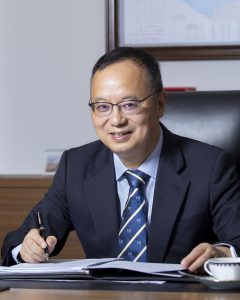
UM Rector Yonghua Song
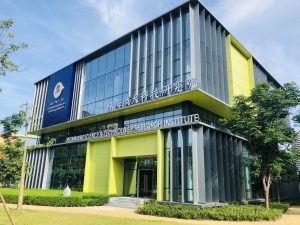
UM researchers commercialise their research results through ZUMRI
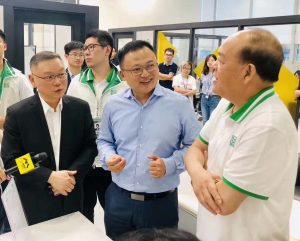
Prof Wang Chunming (middle) explains how his team developed the Golden Wound
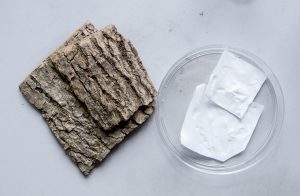
Golden Wound Dressing
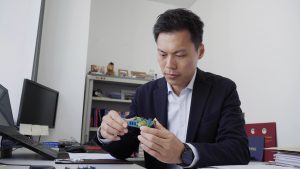
Prof Lu Yan believes the Cooperation Zone will facilitate the commercialisation of chip technologies developed by UM
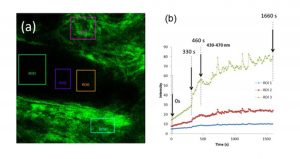
The blood fluoroscope developed by Prof Liu Tzu-Ming’s team, which can reduce mortality rates among patients with serious illnesses
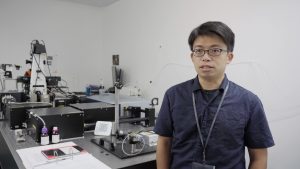
Prof Liu Tzu-Ming
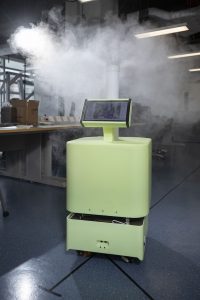
The smart disinfection robot developed by Prof Xu Qingsong’s team can substitute for frontline disinfection workers
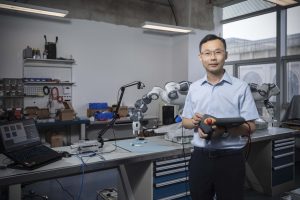
Prof Xu Qingsong
